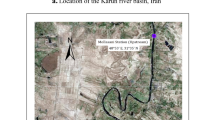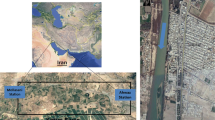Abstract
The Muskingum model is the most widely used and efficient method for flood routing in hydrologic engineering; however, the applications of this model still suffer from a lack of an efficient method for parameter estimation. Thus, in this paper, we present a hybrid particle swarm optimization (HPSO) to estimate the Muskingum model parameters by employing PSO hybridized with Nelder–Mead simplex method. The HPSO algorithm does not require initial values for each parameter, which helps to avoid the subjective estimation usually found in traditional estimation methods and to decrease the computation for global optimum search of the parameter values. We have carried out a set of simulation experiments to test the proposed model when applied to a Muskingum model, and we compared the results with eight superior methods. The results show that our scheme can improve the search accuracy and the convergence speed of Muskingum model for flood routing; that is, it has higher precision and faster convergence compared with other techniques.






Similar content being viewed by others
Explore related subjects
Discover the latest articles and news from researchers in related subjects, suggested using machine learning.References
Mohan S (1997) Parameter estimation of non-linear Muskingum models using genetic algorithm. J Hydrol Eng 123(2):137–142
Yoon J, Padmanabhan G (1993) parameter estimation of linear and nonlinear muskingum models. J Water Resour Plan Manag 119(5):600–610
Geem ZW (2006) Parameter estimation for the nonlinear Muskingum model using the NMSM technique. J Irrig Drain Eng 132(5):474–478
Chen J, Yang X (2007) Optimal parameter estimation for Muskingum model based on Gray-encoded accelerating genetic algorithm. Commun Nonlinear Sci Numer Simul 12(5):849–858
Chu HJ, Chang LC (2009) Applying particle swarm optimization to parameter estimation of the nonlinear Muskingum model. J Hydrol Eng 14(9):1024–1027
Luo J, Xie J (2010) Parameter estimation for nonlinear Muskingum model based on immune clonal selection algorithm. J Hydrol Eng 15(10):844–851
Barati R (2011) Parameter estimation of nonlinear Muskingum models using Nelder–Mead simplex algorithm. J Hydrol Eng 16(11):946–954
Xu DM, Qiu L, Chen SY (2011) Estimation of nonlinear Muskingum model parameter using differential evolution. J Hydrol Eng 17(2):348–353
Kennedy J, Eberhart R (1995) Particle swarm optimization. In: Proceedings of IEEE international conference on neural networks, vol 4. Piscataway, NJ: IEEE Press, pp 1942–1948.
Chen D, Zhao C, Zhang H (2011) An improved cooperative particle swarm optimization and its application. Neural Comput Appl 20(2):171–182
Ghosh S, Das S, Kundu D, Suresh K, Panigrahi B, Cui Z (2012) An inertia-adaptive particle swarm system with particle mobility factor for improved global optimization. Neural Comput Appl 21(2):237–250
Wang H, Zhao G, Li N (2012) Training support vector data descriptors using converging linear particle swarm optimization. Neural Comput Appl 21(6):1099–1105
Jia L, Cheng D, Chiu MS (2012) Pareto-optimal solutions based multi-objective particle swarm optimization control for batch processes. Neural Comput Appl 21(6):1107–1116
Lee WP, Hsiao YT (2012) Inferring gene regulatory networks using a hybrid ga-pso approach with numerical constraints and network decomposition. Inf Sci 188:80–99
Castillo O, Martínez-Marroquín R, Melin P, Valdez F, Soria J (2012) Comparative study of bio-inspired algorithms applied to the optimization of type-1 and type-2 fuzzy controllers for an autonomous mobile robot. Inf Sci 192:19–38
Altun AA, Sahman MA (2013) Cost optimization of mixed feeds with the particle swarm optimization method. Neural Comput Appl 22(2):383–390
Liang JJ, Qin AK, Suganthan PN, Baskar S (2006) Comprehensive learning particle swarm optimizer for global optimization of multimodal functions. IEEE Trans Evol Comput 10(3):281–295
Liang JJ, Suganthan PN (2005) Dynamic multi-swarm particle swarm optimizer. In Swarm intelligence symposium, 2005. SIS 2005. Proceedings 2005 IEEE (pp. 124–129).
Liang JJ, Suganthan PN, Chan CC, Huang VL (2006) Wavelength detection in FBG sensor network using tree search DMS-PSO. IEEE Photonics Technol Lett 18(12):1305–1307
Zhao SZ, Suganthan PN, Das S (2010) Dynamic multi-swarm particle swarm optimizer with sub-regional harmony search. 2010 IEEE congress on in evolutionary computation (CEC) (pp. 1–8).
Mallipeddi R, Suganthan PN (2011) Ensemble differential evolution algorithm for CEC2011 problems. 2011 IEEE Congress on evolutionary computation (CEC). IEEE 2011:1557–1564
Derrac J, Garcia S, Hui S, Herrera F, Suganthan P N (2013) Statistical analysis of convergence performance throughout the evolutionary search: a case study with SaDE-MMTS and Sa-EPSDE-MMTS. In Differential evolution (SDE), 2013 IEEE symposium on (pp. 151–156)
Huang VL, Qin AK, Suganthan PN (2006) Self-adaptive differential evolution algorithm for constrained real-parameter optimization. In Proceedings of IEEE congress on evolutionary computation (pp. 17–24).
Qin AK, Huang VL, Suganthan PN (2009) Differential evolution algorithm with strategy adaptation for global numerical optimization. IEEE Trans Evol Comput 13(2):398–417
Yang X, Yang Z, Lu G, Li J (2005) A gray-encoded, hybrid-accelerated, genetic algorithm for global optimizations in dynamical systems. Commun Nonlinear Sci Numer Simul 10(4):355–363
Achiche S, Baron L, Balazinski M (2004) Real/binary-like coded versus binary coded genetic algorithms to automatically generate fuzzy knowledge bases: a comparative study. Eng Appl Artif Intell 17(4):313–325
Zhu Z, Zhou J, Zhen J, Shi YH (2011) DNA sequence compression using adaptive particle swarm optimization-based memetic algorithm. IEEE Trans Evol Comput 15(5):643–658
Zhan ZH, Zhang J, Li Y, Shi YH (2011) Orthogonal learning particle swarm optimization. IEEE Trans Evol Comput 15(6):832–847
Chen WN, Zhang J, Lin Y, Chen N, Zhan ZH, Chung HH, Li Y, Shi YH (2013) Particle swarm optimization with an aging leader and challengers. IEEE Trans Evol Comput 17(2):241–258
Li X, Yao X (2012) Cooperatively coevolving particle swarms for large scale optimization. IEEE Trans Evol Comput 16(2):210–224
Qu B, Suganthan P, Das S (2013) A distance-based locally informed particle swarm model for multimodal optimization. IEEE Trans Evol Comput 17(3):387–402
Ho S, Yang S, Ni G, Huang J (2013) A quantum-based particle swarm optimization algorithm applied to inverse problems. IEEE Trans Magn 49(5):2069–2072
Ouyang A, Tang Z, Zhou X, Xu Y, Pan G, Li K (2014) Parallel hybrid PSO with CUDA for lD heat conduction equation. Comput Fluids doi:10.1016/j.compfluid.2014.05.020
Ouyang A, Tang Z, Li K, Sallam A, Edwin S (2014) Estimating parameters of Muskingum model using an adaptive hybrid PSO algorithm. Int J Pattern Recogn Artif Intell 28(1):1–29
He Q, Wang L (2007) An effective co-evolutionary particle swarm optimization for constrained engineering design problems. Eng Appl Artif Intell 20(1):89–99
Liu B, Wang L, Liu Y, Qian B, Jin Y-H (2010) An effective hybrid particle swarm optimization for batch scheduling of polypropylene processes. Comput Chem Eng 34(4):518–528
Ren X, Hao R, Sun Z, Shi B (2010) Quantum behaved particle swarm optimization algorithm based on simplex method. Microelectron Comput 27(1):154–157
Nelder JA, Mead R (1965) A simplex method for function minimization. Comput J 7(4):308–313
Chen J, Ren Z, Fan X (2006) A hybrid optimized algorithm based on improved simplex method and particle swarm optimization. Proceeding fo the 25th Chinese control conference, 7–11 August, 2006, Harbin, Heilongjiang.
Zhao RJ (1992) The xinanjiang model applied in china. J Hydrol 135(1–4):371–381
Das A (2004) Parameter estimation for Muskingum models. J Irrig Drain Eng 130(2):140–147
Jin J, Ding J (2000) Genetic algorithm and its applications for water science. Sichuan University Press, Sichuan
Abdul-Rahman OA, Munetomo M, Akama K (2013) An adaptive parameter binary-real coded genetic algorithm for constraint optimization problems. Performance analysis and estimation of optimal control parameters. Inf Sci 233:54–86
Derrac J, García S, Molina D, Herrera F (2011) A practical tutorial on the use of nonparametric statistical tests as a methodology for comparing evolutionary and swarm intelligence algorithms. Swarm Evol Comput 1(1):3–18
Acknowledgments
This paper is partially funded by the Key Program of National Natural Science Foundation of China (Grant No. 61133005), and the National Natural Science Foundation of China (Grant Nos. 90715029, 61070057, 60603053, 61103047), and the Ph.D. Programs Foundation of Ministry of Education of China (20100161110019). Meanwhile, the paper was supported by the Research Foundation of Education Bureau of Hunan Province (No.13C333), the Project and the Science and Technology Research Foundation of Hunan Province (Grant No. 2014GK3043).
Author information
Authors and Affiliations
Corresponding author
Rights and permissions
About this article
Cite this article
Ouyang, A., Li, K., Truong, T.K. et al. Hybrid particle swarm optimization for parameter estimation of Muskingum model. Neural Comput & Applic 25, 1785–1799 (2014). https://doi.org/10.1007/s00521-014-1669-y
Received:
Accepted:
Published:
Issue Date:
DOI: https://doi.org/10.1007/s00521-014-1669-y




